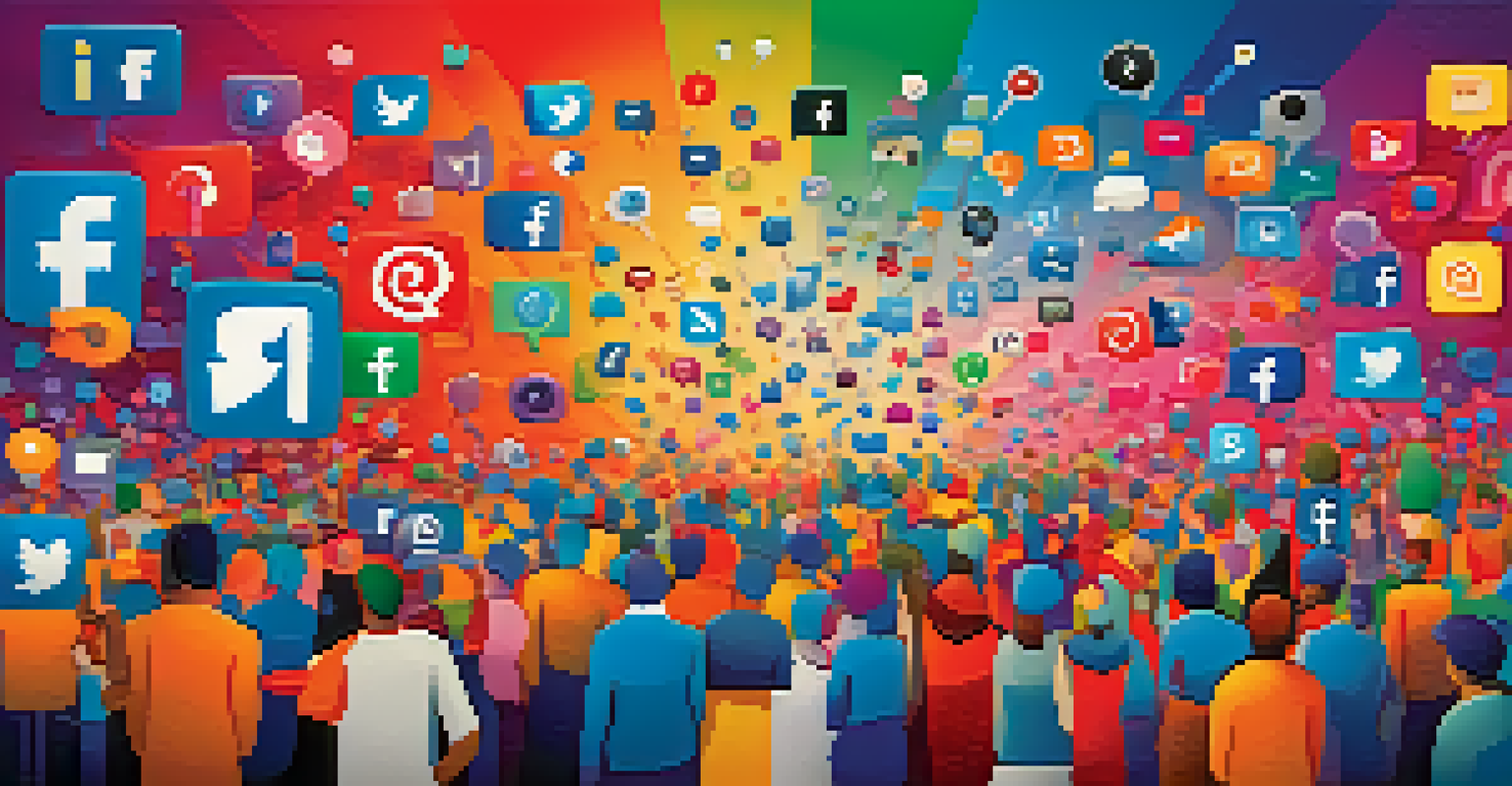The Role of Digital Literacy in Responsible Online Behavior

What is Digital Literacy and Why It Matters
Digital literacy refers to the ability to find, evaluate, and communicate information using digital technologies. In today's world, having these skills is essential, as much of our communication and information consumption happens online. Just like reading and writing, digital literacy is a fundamental skill that empowers individuals to navigate the complexities of the internet safely and effectively.
The internet is a powerful tool, but with great power comes great responsibility.
As we engage with various online platforms, the need for digital literacy becomes even more evident. It not only helps us interact with technology but also informs our understanding of the digital world, including how to differentiate between credible sources and misinformation. This ability is crucial for making informed decisions and participating in civil discourse.
Moreover, in an age where misinformation can spread like wildfire, being digitally literate enables individuals to critically assess the information they encounter. It fosters responsible online behavior, ensuring that users can contribute positively to discussions and avoid falling prey to scams or harmful content.
The Connection Between Digital Literacy and Online Safety
One of the most significant benefits of digital literacy is enhanced online safety. Understanding how to protect personal information and recognize potential threats is vital in today's digital landscape. For example, knowing how to create strong passwords and identifying phishing attempts can drastically reduce the risk of cyberattacks.

When individuals are equipped with digital literacy skills, they are more likely to navigate online spaces with caution. This includes being aware of privacy settings on social media and understanding the implications of sharing personal information. A digitally literate individual knows that not everything online is what it seems, which is crucial for maintaining safety.
Digital Literacy Empowers Users
Digital literacy equips individuals with the skills to evaluate information and navigate the internet safely.
In essence, digital literacy serves as a shield against online dangers. By recognizing and responding to threats, users can create a safer digital environment for themselves and others. This proactive approach to online behavior fosters a community where safety and respect are prioritized.
Building Critical Thinking Skills Through Digital Literacy
Digital literacy is closely linked to the development of critical thinking skills. As users engage with diverse content online, they learn to evaluate sources for credibility and relevance. This process is akin to a detective scrutinizing evidence to determine what is true and what is not.
In a world where information is at our fingertips, digital literacy is no longer optional; it’s essential.
Being digitally literate means asking the right questions when encountering information: Who is the author? What is the purpose of this content? Is it backed by evidence? By fostering these critical thinking habits, individuals become more discerning consumers of information.
Ultimately, critical thinking enhances responsible online behavior. When users can assess and analyze information critically, they are less likely to engage in the spread of misinformation and can contribute to more informed discussions online.
The Importance of Ethical Online Communication
Ethical communication online is a cornerstone of responsible behavior, and digital literacy plays a pivotal role in this. Understanding the implications of our words and actions in a digital space can prevent misunderstandings and conflicts. For instance, knowing how tone and context can be misinterpreted online encourages individuals to communicate more thoughtfully.
Moreover, digital literacy encourages respect and empathy in online interactions. By being aware of the diverse backgrounds and perspectives of others, individuals can engage in more constructive conversations and minimize the chances of online harassment or bullying. This understanding fosters a healthier online community.
Critical Thinking Enhances Online Safety
Being digitally literate fosters critical thinking, which helps users assess sources and avoid misinformation.
In summary, ethical communication, rooted in digital literacy, enhances the quality of our interactions. By prioritizing respect in our online behavior, we contribute to a more positive digital landscape for everyone.
Navigating Social Media Responsibly
Social media is a powerful tool for connection, but it also requires responsible navigation. Digital literacy equips users to understand the nuances of different platforms, including privacy settings and community guidelines. By being aware of how these platforms operate, individuals can better manage their online presence.
Additionally, digital literacy fosters awareness of the potential consequences of sharing content. Before hitting 'share,' users should consider the impact their posts may have on others. This includes recognizing the permanence of online content and the potential for it to affect relationships or reputations.
By promoting responsible social media use, digital literacy allows for more meaningful connections while minimizing misunderstandings or conflicts. Ultimately, it empowers users to enjoy the benefits of social media while navigating its challenges.
The Role of Digital Citizenship in Online Behavior
Digital citizenship encompasses the responsible use of technology and the internet. It involves understanding one’s rights and responsibilities as a digital participant. Digital literacy is foundational to effective digital citizenship, as it provides the tools needed to navigate online spaces ethically and respectfully.
Being a good digital citizen means contributing positively to online communities and engaging in civic participation. This includes advocating for issues that matter and using digital platforms to amplify voices. Digital literacy encourages individuals to become informed participants who understand the impact of their actions.
Responsible Social Media Use
Understanding digital literacy promotes ethical communication and responsible navigation of social media platforms.
In essence, cultivating digital citizenship through digital literacy leads to a more engaged and responsible online community. Individuals who embrace these principles are better equipped to contribute to discussions and advocate for positive change in the digital realm.
The Future of Digital Literacy and Online Behavior
As technology continues to evolve, so does the importance of digital literacy. The rapid pace of change means that individuals must continually adapt their skills to keep up with new tools and platforms. This ongoing learning process is vital for maintaining responsible online behavior in an ever-changing digital landscape.
Looking ahead, it is essential to prioritize digital literacy education across all age groups. By integrating these skills into school curricula and community programs, we can empower future generations to engage with technology responsibly. This proactive approach ensures that individuals are equipped to handle the challenges of the digital age.

Ultimately, fostering a culture of digital literacy will lead to a more informed and responsible online community. As we embrace the future, we must remember that our digital interactions shape not only our lives but also the world around us.